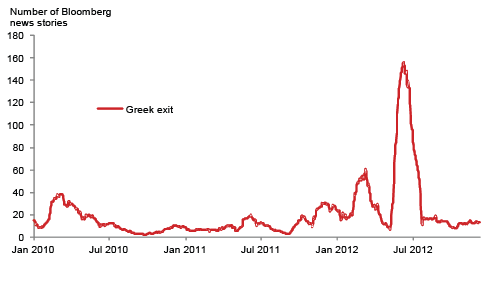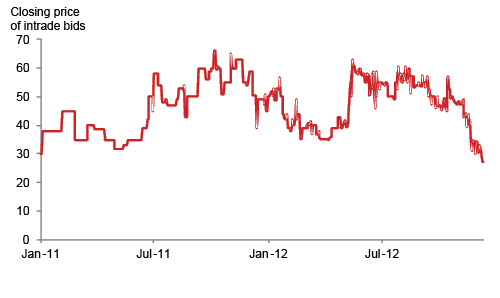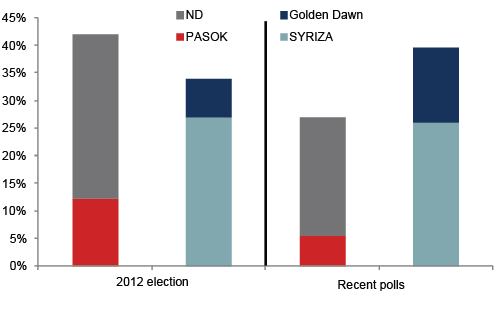Yves here. This VoxEU post gives a back-of-the-envelope estimate of the odds of Greek exit from the Eurozone. In case you find the result to be reassuring, in the runup to the financial crisis, yours truly pegged the odds of a very very bad outcome at 20% to 30%, which I considered to be scarily high given the consequences (mind you, I didn’t see the alternative as good outcomes, merely less than a full blown Japan-style bubble aftermath). Keep in mind that the conventional wisdom among most economists and Eurocrats is that the cost to Greece of leaving to the country itself is so high that it will never happen. But revolutions also typically make conditions for ordinary people much worse before any improvements take place. When people are desperate, they will lash out against their perceived oppressors. Whether Greece gets to that point, and how it would escalate, are very much open questions.
By Jens Nordvig, Head of Fixed Income Research, Americas and Global Head of FX Strategy at Nomura. Cross posted from VoxEU
Fears about a Greek exit from the Eurozone reached a peak around May 2012. At the time, the first round of the Greek election gave the populist Syriza party enough support for it to block the formation of reform and a bailout-friendly government.
How much people focus on the risk of a Greek exit at any given point in time can be quantified by tracking the volume of news reporting on the issue. Figure 1 shows a specific metric derived from counting news stories on the Bloomberg system.
Figure 1 Frequency of “Greek exit” in the news
Note: Chart shows number of news stories for keywords “Greece” and “exit”; “Grexit”; “Greek exit” in Bloomberg over time, calculated as a one month moving average of daily data.
Source: Nomura, Bloomberg.
It is clear that the concerns about a Greek exit, as reflected in the intensity of news coverage, have receded notably from their peak in the early summer period.
Measuring Exit Probability with Asset Prices?
In the run-up to the launch of the euro in 1999, it was common to look at asset prices and derive implied probabilities of Eurozone entry (see Favero et al. 1999, De Grauwe 1996). A typical approach was to look at forward rates for individual countries and use the deviation from German forward rates to solve for the probability of EMU entry (using various assumptions about the counter-factual scenario).
The analytical challenge at the current juncture is that country-specific financial market instruments for Eurozone countries reflect various risk premiums simultaneously. This makes it difficult to reliably identify the part of the risk premiums that specifically pertain to Eurozone exit risk. This is the case both for credit default swaps instruments and for sovereign bonds. Spreads on these instruments reflect both sovereign default risk and currency risk in an exit scenario1.
Another route to estimating the probability of exit (and therefore currency redenomination) would be to look at the pricing of comparable foreign law and local law bonds. Since foreign law bonds are outside the legal domain of a given country, they are harder to redenominate in an exit2. Hence, one would expect local law bonds to trade at a discount relative to foreign law bonds, reflecting the additional currency risk. But such an interpretation of the foreign-law-local-law bond spread requires that the default risk in the two bonds is the same, and this may not always be a realistic assumption. Additionally, after the Greek debt restructuring, there are essentially no local law government bonds left in Greece.
Finally, ‘non-deliverable forward’ contracts for the future currency of Greece could, in theory, be used to strip out the probability of exit3. This method has been used in the past to estimate the probability of de-pegging in countries with a fixed exchange rate regime4. Some private sector investment banks have attempted to create a non-deliverable forward market for future Eurozone currencies. But a liquid market has never developed, and no reliable market pricing exists for individual Eurozone countries’ non-deliverable forward contracts at this point.
In short, there currently is no reliable financial market-based metric from which we can derive the implied probability of a Greek exit from the Eurozone.
An Alternative: Spread-Betting Measures
Spread-betting metrics, on the other hand, do provide relatively direct metrics of the probability of some form of Eurozone breakup. For example, customers of the spread-betting firm InTrade can bet on whether exit by a current Eurozone member country will or will not happen by end-2013. The probability of a form of Eurozone breakup is determined from the supply and demand of such bets.
One should be aware that spread-betting markets are generally less liquid than traditional financial market instruments. Nevertheless, it is interesting to observe that InTrade has shown a clearly declining probability of Eurozone breakup over the last few months.
Figure 2 Expected probability of a Eurozone break-up has declined (%)
Note: Chart shows closing price of InTrade bids for the topic: “Any country currently using the Euro to announce intention to drop it before midnight Eastern Standard Time 31 Dec 2013”. Calculated as a 1 month moving average of daily data.
Source: Nomura, InTrade
As the chart shows, the probability of a Eurozone breakup by 2013 was above 60% in the summer, and has now dropped below 30%. However, this probability embeds multiple exit scenarios. Some of the decline is due to reduced risk of exit by other Eurozone countries, such as Spain5.
Most would agree that the risk of exit by 2013 of ‘other Eurozone countries’ – countries that feel they are being dragged down by the Eurozone’s crisis-stricken countries – has been significantly reduced as a function of the outright monetary transactions programme, as well as by favourable political developments in countries such as Holland. To illustrate, if we put the probability of exit of other Eurozone countries at 5-10%, the implied risk of a Greek exit would stand at 17-22%.
Cross-checking with Greek Political Indicators
How does an exit probability of approximately 20% fit with the political situation in Greece?
Given that Eurozone partners are unlikely to actively push for a Greek exit, one should arguably focus on the domestic political parameters in Greece that would trigger exit. From this perspective, one can think of the probability of a Greek exit as a function of the probability of early elections and the probability of a defeat of the reform-friendly parties – New Democracy (ND), PASOK and the Democratic Left.
Figure 3 Support for Greek political parties over time
Note: Recent polls date from 24 November.
Source: Nomura, PulseRC
Recent opinion polls consistently put SYRIZA ahead of New Democracy. Meanwhile, Golden Dawn, an extreme right party, stands to become third largest, well ahead of PASOK. Since the largest party gets 50 bonus seats in the Greek parliament under current electoral law6, a SYRIZA victory could potentially even yield it an outright majority. The probability of SYRIZA taking office in an early election is therefore around two thirds, based on current information.
Early Election
An early election could be triggered by a number of events. Failure of the current government to approve future conditions from the Troika during quarterly reviews in 2013 is one route. A gradual bleeding of MPs from ND, Pasok and Democratic Left, which would cause the current coalition to lose its majority, is another route. It is hard to estimate the cumulative risk of early elections, but an estimate of around 25% would not seem wide of the mark.
If the probability of early elections is around 25%, and if a SYRIZA victory has a probability of around two thirds, this implies that the likelihood of a SYRIZA led government is a touch below 20%7.
The probability of a Greek exit – around 20%, as implied by InTrade spread-betting data – is perhaps slightly higher than what we can derive from an assessment of political risk in Greece. Nevertheless, both estimates are in the same neighborhood, suggesting a Greek exit risk to be in the region of 15-20%.
Conclusions
Policymakers cannot claim victory in the Eurozone crisis just yet. The ECB’s outright monetary transactions program has helped to reduce funding risks for sovereigns. Linked to this, the risk of disorderly default – and exit from the Eurozone – has also been reduced. But political risk remains a serious concern, and this risk cannot be addressed through liberal liquidity provisions. Moreover, continued weak growth in the region has the potential to fuel populist sentiment, implying that political risk may be rising.
With respect to Greece, the opinion polls point to a highly unstable political climate. This indicates that early elections, should they be called, could cause a dramatic resurfacing of Eurozone exit fears.
Importantly, political risks are not confined to Greece, as demonstrated by recent developments in Italy. The conclusion is that ‘political events’ are set to increasingly drive Eurozone asset prices. Thus, we are in a different situation to where we were in July 2012, when the ECB had yet to articulate a mechanism to contain sovereign funding risk. Since political risk is hard to quantify for investors, this creates a persistent sense of unease. The implication is that Eurozone financial assets will continue to embed significant risk premiums in 2013 and beyond.
See VoxEU for references





How about linking the probability (inversely) to American Democrat Congress and Senate and President selling out Social Security and bankster bailouts on the backs of the working poor and middle class, despite the recent election indicating voter disapproval?
Are there no links between the corruption of Washington by Wall St and the failed economics/Wall St leveraged buyout of Europe?
Isn’t that precisely what we’re seeing now?
Sorry if i am being too naive here; my nausea from watching DC presently distorts my perception abilities.
I agree with your analysis. One wrinkle I guess is what an announcement to stop using the euro would mean for a specific currency. I assume it would involve printing one’s own currency, in Greece’s case presumably new Drachma. I find persuasive the arguments that for small open economies like Greece there is little advantage in doing this because their costs are so strongly driven by import prices. Printing one’s own currecny in such circumstances can simply add high inflation to the country’s other problems. I know there are those who argue that it would enable devaluation and thereby make exports more competitive, but that ducks the questions exports of what and to whom. I associate Greece with tourism, wine and olives, would love to think that they had significant other exports but somehow doubt it.
So the probability of Grexit from InTrade presumably does not allow for another possibility, that Greece defaults completely on all official debts but continues to use the euro (presumably gets slung out of the European system of Central Banks)
I doubt the Euro is such a blessing…
If your exports collapse, your imports do also…. why order inputs if you are not producing?
Currency devaluations works, especially when you are the first one to do it, that’s why the UK has always done it.
The difference is scale, though, is the relevant point. The UK economy is much larger than the Greek.
I understand some of the Balkan countries use the euro even though non-members of the EZ for similar sorts of reasons (and the dollar is used widely outside the US?)
I think it comes down to measuring imports and exports.
If they stick to Euro: exports are limited because products are too expensive plus no one will touch them with a ten foot pole…so no money coming into their economy… lack of exports limits imports for consumption as well as imports that go into production for exports.
If they get out of Euro and devalue: investors will come back in, this will help imports and exports.
But history has shown us that some countries fight back and others disappear… I guess time will tell.
Domestic currency printing & Redenomination of all debts by PIg nations reduces hard currency export…..
The Greek oil balance has not moved in 3 years while its capital account has been destroyed.
This is a characteristic of all Euro Pig countries.
They cannot use labour to replace fuel inputs as they do not have enough tokens in the economy to pay people.
Maybe Greece’s fate will be teased out when the Syrian crisis ends.
For those interested, you can find the Italian translation of this article by clicking on this link:
http://www.forexinfo.it/Grecia-come-misurare-la